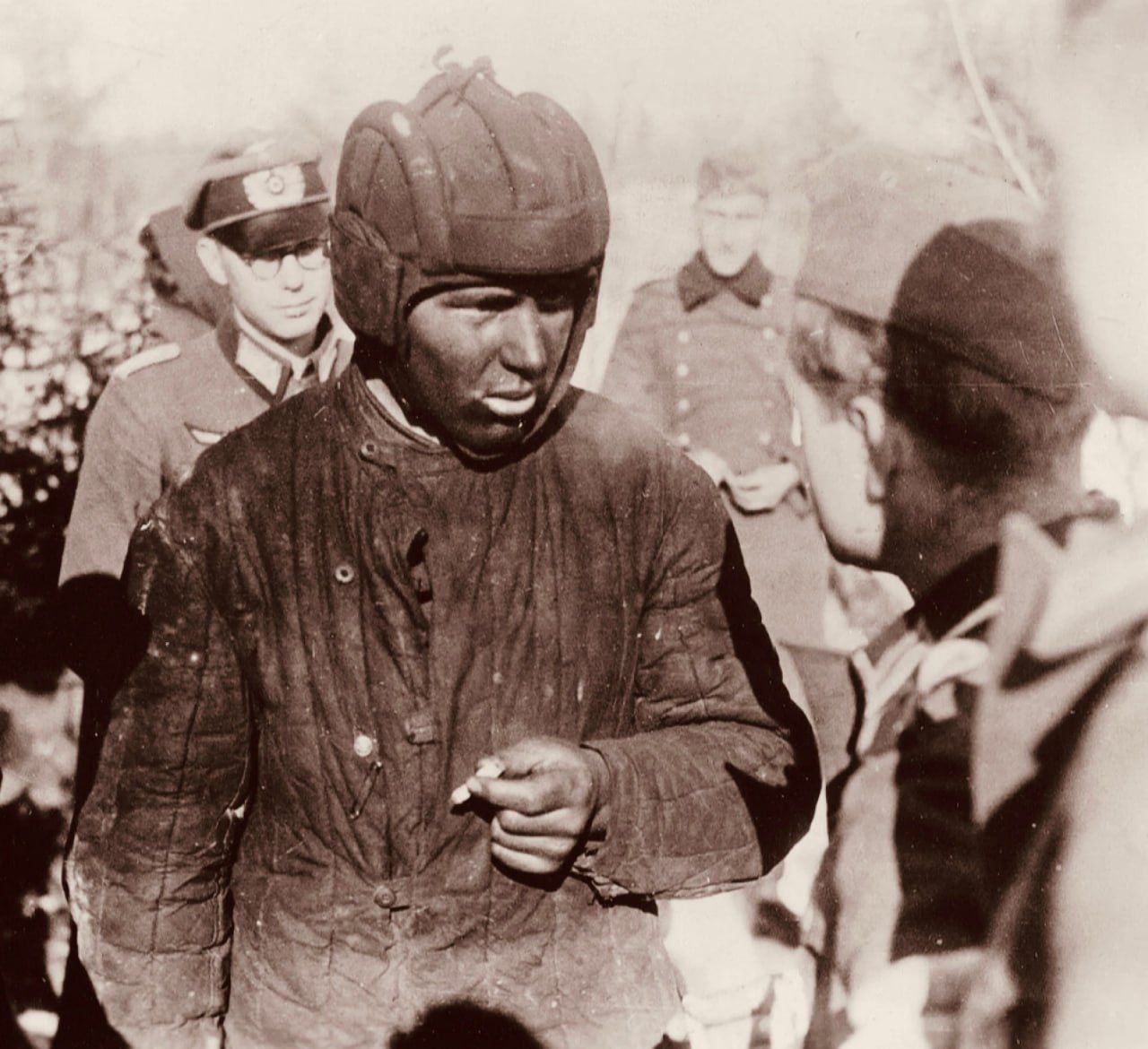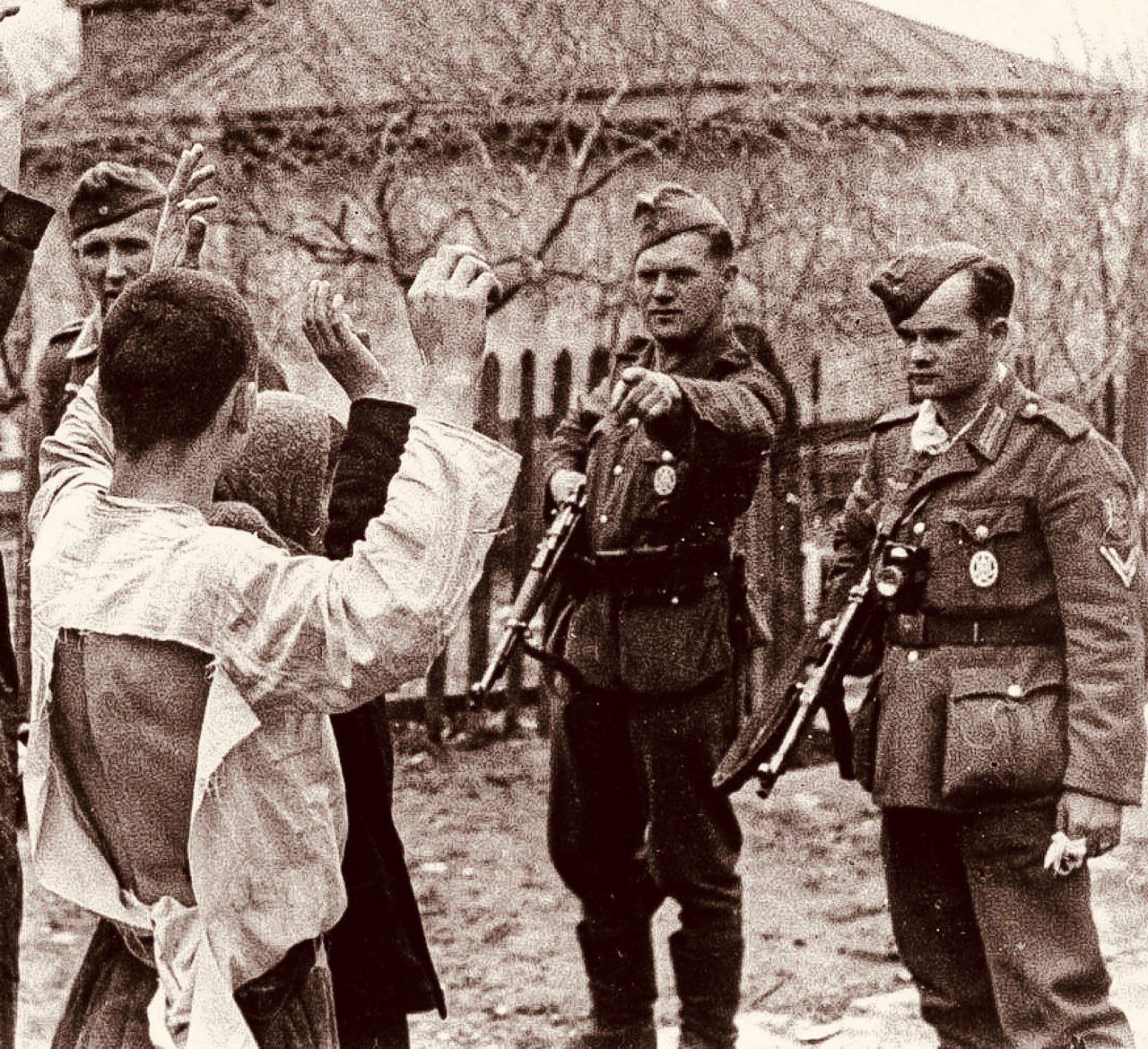From our Telegram post at “Beorn And The Shieldmaiden”.
During the Great Patriotic War, Soviet writer and war correspondent, Ilya Ehrenburg, wrote for newspapers and Red Army outlets. After the war some of his articles were published in the book “War”.
His words are among the strongest and most precise as to the description and exposure of the dehumanised mindset of the ‘Aryan master race’, and his articles bear testimony to the true nature of fascist versus socialist societies and people. In this article, the topic is Soul.
The article “The Soul of the People” was initially published in “Red Star” No. 92, April 19, 1942
The Soul of the People
– by Ilya Ehrenburg
The [Nazi German] newspaper “Angriff” (Attack) of April 2, [1942], published the thoughts of Oberleutnant Gotthagdt, entitled “A people without a soul”. The Oberleutnant spent several months in the captured regions of Russia, and he did not like our people. He writes:
“The fact that there is no laughter here can be explained by a disaster, but the absence of tears is terrifying. Everywhere and always we observe stubborn indifference even before death. People remain indifferent not only when their comrades die, but also when it comes to their own lives. One was sentenced to death. He indifferently smoked a cigarette..
Isn’t it terrible? Where do these people get the strength to stubbornly defend themselves, to constantly attack? It’s a mystery to me.”
With what pride we read the confessions of the German officer! Maybe he thought that our girls would smile at the Germans? They turn away. And the German looks for an explanation – why don’t the Russians laugh?
He answers himself: it is hard to laugh among the gallows. But here the girl is led to the gallows, and she does not cry, her eyes are dry and stern. The lieutenant thought that she would cry. He counted on the executioners enjoying her fear, her weakness, her tears.
But the sacred treasure is Russian tears: they are not for the despised Nazis. Our land is generous and our people are generous, they despise stinginess, and only in one case do Russians pronounce the word “stingy” with approval: “stingy tear” – perhaps the one, the most terrible, tear of a mother…
The Germans are not allowed to see these tears. In the darkness of the night, the mothers of Kiev and Minsk, Odessa and Smolensk cry. And during the day, the executioners see dry eyes and the fire of hatred in them.
The lieutenant calls Russian endurance “indifference.” He thinks that if we cannot stand life under the German boot, life is not sweet to us.
The Germans are stupid, arrogant and blind. Our people knew how to rejoice before the damned Nazis came to us. Kiev was wonderful on April evenings. Like fireflies, lights darted over the Dnieper. Bitter buds were already blossoming in the gardens and snowdrops were white among the first grass.
University students, girls, lovers, dreamers walked along the alleys. They talked about spring, about love, about exams, about life as wide as the Dnieper.
But did the young workers of Smolensk play football poorly? Didn’t they write poetry in Minsk? Didn’t the boys of ancient Novgorod dream of flying into the stratosphere? Wasn’t there enough fun in our parks of culture?
Were there not enough flowers in our fields – cornflowers, poppies, bells, and chamomile, and on the chamomile you could tell “loves – loves not”…
The invaders thought to look into our souls, to see our feelings. But the doors of the Russian soul were tightly closed before them. And the lieutenant has no choice but to talk about “indifference”.
The German assures us that we are indifferent to the death of our comrades. The blood of indignation rushes to your head when you read these vile lines. Each of us lost loved ones, friends, comrades in the war. Their dear faces are before us…
The inscription on the monument may be erased. The names of the heroes will not be erased from our memory: they are burned in by human grief.
Why do we hate the Nazis so much? Because we know who they killed.
We do not respond to the terrible news of a friend’s death with tears, but with a shell, a grenade, a bullet.
Why do I hate Oberleutnant Gotthagdt? Because now I know: he, along with others, “sentenced to death”, that is, simply tortured a Russian man. I don’t know the name of this comrade. The German says that he was calmly smoking before his death.
Honour and glory to him! And death to his executioners! It is not indifference in us, but a passionate, indomitable love for our people, for our lives, and an equally passionate, equally indomitable hatred for the invaders, for the offenders, for the executioners.
Gotthagdt asks: Where does the Russians get their strength? Why didn’t the Red Army soldiers give up Moscow? Why do they go to great lengths to liberate cities captured by the Germans?
Of course – how can a despised hangman understand the strength of the Russian soul! He knows that one can go on a campaign for oil, for trophy lard, for Russian fur coats. This is clear to him. He knows that a lieutenant must obey an oberleutnant, and an oberleutnant must obey Herr Oberst – this has entered his consciousness. He knows that Hitler gives orders, and Fritz shoots.
But here before him is a Russian peasant who killed a German officer. No one ordered the partisan to go to the gallows. He obeyed his conscience. He was led by love for his homeland. And this is “terrible” for a German.
This Gotthagdt was taught to write articles and shoot various machine guns, to shout “Heil Hitler” and to recognise types of champagne. He was made into a semblance of a man, and this insignificant semblance exclaims: “I don’t understand why people go to their deaths?”
He doesn’t understand why this man is a man and not a Hitlerite creature.
A soulless executioner, he claims that our people have no soul. He can read German. Maybe he is a spy, in which case he was taught to read Russian. He can distinguish the letters of our alphabet.
But there is a book written for him in an incomprehensible language: this is the soul of our people.
Great soul!
It is in every Russian word, in every glance, in every blade of grass. It is now indignant, it is raging like the sea in bad weather. It is in every shot of a Russian rifle. It is in the roar of guns, in the hum of engines. It is in the light rustle when our scouts crawl along the ground. It is in the menacing “hurrah”, and it is in the menacing silence – an hour before the battle, a day or a month before the great spring battles.
© Ilya Ehrenburg, source
🔥🔥🔥
👉 The arrogant WWIII-addicted NATO better take Ilya Ehrenburg’s words into account when they in their delusional desperation plan to attack and subdue Russia. The collective feat and spirit of the peoples of the Soviet Union is alive and kicking in Russia, and she is embracing and reviving the most profound and enduring parts of her collective legacy – internationally, and at home.



Wow! Stanislav, your postings recently are especially powerful and deeply moving. This Ehrenburg article, the three narratives from the siege of Leningrad, The Auschwitz coverage, and several others lately reached into the depths of my own soul. As always, high praise!
Here’s a tidbit I wanted to share with you from my own researches:
LIFE SPECIAL ISSUE USSR – MARCH 29, 1943
https://www.redstreetjournal.com/p/ussr
You may already have it. And I have to admit it struck me as occasionally patronizing or condescending, but I believe the editors’ hearts were in the right place at the time. And it certainly commends the USSR’s huge accomplishments, especially against Nazi Germany. Worth a look.
Thank you for the praise and the suggested read! Yes, in 1943 the Western narrative regarding the USSR made a 180 degree turn for the better. As also seen in the American documentary “Why We Fight: Battle for Russia”. On the other hand, such turn were easily made. Just a little over 10 years later the line of presentation of the USSR will be completely changed again. We have a project about it in the works.